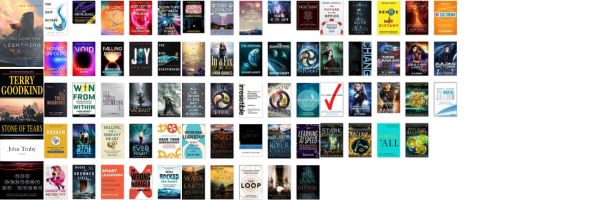Here’s some of the hardest advice to hear: your book isn’t for everyone. I’ve seen this advice come up more and more on social media the last couple of weeks so I thought I would weigh in.
As for regular life, it’s been busy. We’ve got lots going on with our house (all good things), business is starting to ramp up, and the kids are back to school. It’s going to be an interesting year.
Drawing from the Well
Nothing to see here, unfortunately. After my baller week last week, I got basically nothing done. I’ve got to do a huge amount of work on the first chapter (or three?) of the fourth arc to get them to feel right. They’re very bare bones right now. I need focus for that, which comes early in the morning. That, of course, necessitates me getting up early in the morning. I’m reworking my sleep schedule to make that happen and I’m just about there. Hopefully that means there’ll be something to speak of next week.
Page 180/284
91,573/145,371 Words
Filling the Well
Writing wasn’t great, but reading was! I finished another four books, primarily the Far Reaches Collection. The latter three books were the best of the bunch. I thoroughly enjoyed them. The Ship Beyond Time, the fourth finish this week, was good, but nowhere near as good as the Girl from Everywhere. It closed the loops it opened in the first book, but the story just wasn’t as compelling, sadly. Now I’m listening to Too Like the Lightning. I anticipated this book with great excitement. Unfortunately, the narrator is making it hard for me to enjoy the book. It’s very long with a lot of storylines and intrigue going on. It’s hard for me to follow and, thus, hard to enjoy. I’m going to finish it, but it’s not going to get a high rating for me. I’m sure it’s a great book for many. It just didn’t stick for me. That actually feeds into today’s topic…
69/105 for #ProjectBookworm2023
Well Chat
As I said at the top, a tough truth to hear and internalize is that your book isn’t for everyone. The catch here is that there are two parts to that statement.
The first part is that your book isn’t for EVERYONE. You have a specific vision in mind for the story you’re telling. It’s specific to you, what formed you, the influences you fed on, and your experience. That isn’t for everyone. You have to write something authentic. There are no new stories out there. Many have boiled down the millions of stories out there into a few handfuls of archetypes (or fewer). Your only choice, then, is to write one of these archetypes with your unique take on it. And don’t seek the archetypes out, especially on your first go. You’ll fall into one; don’t worry about that. Considering that you’re going to create a unique take on a story, that won’t be everyone’s taste. Even after you filter down through genre and age category preferences, every story archetype can be told in that framework. Not everyone likes every archetype. Not everyone even likes the same archetype told different ways. Find your audience and you will find success.
The second part sounds like the first but is very different: YOUR BOOK isn’t for everyone. Many writers, especially those who are capable of rapid release, write to trends because they can get the books out fast enough to suit them. I am definitely not one of those types of writers. Many writers do and should employ beta readers to review the story before release. Oftentimes, beta readers will have conflicting constructive criticisms. You cannot please everyone. If you write to trend and your heart isn’t in it, it will show in the writing. If you write by committee, for example by employing ALL the feedback you receive, it will dilute down the story you’re trying to tell and turn it into something else. At that point, there will be something for everyone, but it ceases being your book.
What’s important here is to find the middle way between these extremes. Story is made better by input. Readers will point out things you never noticed or even thought of. That absolutely happened with my debut and incorporating some of the feedback from my editor made it a far better book. Notice that I didn’t say that I incorporated ALL of her feedback. I followed my heart and made changes where I agreed and skipped over the bits that I felt were critical to my vision for the book. I couldn’t be happier with how it came out. It isn’t for everyone, though. I found that in the ratings and reviews on Goodreads. And that’s okay. I would rather have a clear, solid vision for my book and have it find its audience who loves it than meet a lukewarm reception.
How do you approach your stories? Do you have a clear vision? Do you build it as you go? How do you factor feedback into it?
May the tide carry you to safer shores.
BSG







